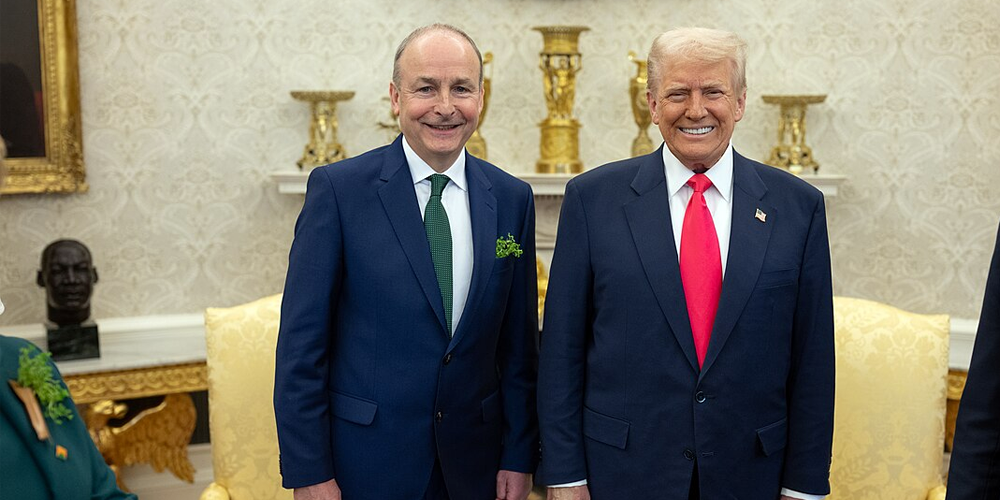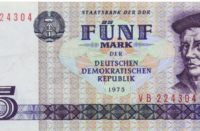May I beg to differ with the carefully created mainstream media consensus surrounding Micheál Martin’s meeting last month with US president Donald Trump and Vice President JD Vance? Ireland’s establishment media took the view that the Taoiseach had very skilfully handled an incredibly challenging situation and had, thankfully, exited the White House without having his ears slapped, à la Zelensky.
Admittedly, it was accepted that Trump has threatened to remove Ireland’s pharmaceutical industry and greatly reduce the amount of exports to the US. Nevertheless, this was practically brushed aside with the excuse that it was essential not to antagonise the Donald. After all, as we were repeatedly reminded, Ireland is beholden to the USA for our supposed “prosperity” thanks to the generosity of their multinationals bestowing us with the benefits arising from foreign direct investment (FDI).
Overlooked in this round of self-serving applause was the fact that the Irish government had achieved absolutely nothing. A fact made embarrassingly clear mere days later, when Trump insulted the entire Dublin administration by hosting the disgraced MMA fighter Conor McGregor on St Patrick’s Day. Indeed, if anything, Martin had reinforced the Irish state’s position of being subservient to the whims of US imperialism: a situation that is an affront to any notion of Irish sovereignty in the first instance but still worse, is detrimental in the long term to the welfare of the overwhelming majority of this country’s people.
For starters, the over-dependence on a small number of multi-national corporations for state revenue and significant employment has been recognised even by free-market economists as a high-risk strategy. Not only are such companies highly mobile and without any organic commitment to Ireland, are liable to take their business elsewhere depending on circumstances. These circumstances may be simply a more attractive offer elsewhere or as a result of arm-twisting by the White House imposing tariffs. This latter option is clearly now on the table and may only be a matter of time before being implemented.
Moreover, there is also the risk that the United States may fall into economic recession or indeed depression. The plethora of erratic measures being abruptly introduced by Donald Trump may inflict damage on the economy. Tariffs coupled with deportation of migrant workers may have the effect of merely increasing prices without benefiting US citizens and thus leading to economic meltdown.
Moreover, the United States has a huge national debt currently in excess of $36 trillion. Influential conservative politicians in Washington believe that this level of debt is unsustainable and are campaigning to have it curbed. To do so, their intention is to cut back on welfare, health and domestic social investment.
Under either scenario there would be a dramatic reduction in American consumer spending, with an obvious detrimental impact on the purchase of Irish imports.
Strange as it may seem but none of this is news to the Dublin government or the Irish ruling class. Indeed, the ESRI and IDA have gone public with their concerns and it now obvious, after Minister for Finance Paschal Donohoe’s interview recently on RTE’s This Week programme, that these fears are shared by those in government.
In reality therefore, Micheál Martin’s cringe-inducing, hand-wringing performance in the Oval Office, rather than being masterly politics was a futile exercise, at least from the standpoint of the broad mass of the Irish public.
By any normal rationale, the Dublin government and its Taoiseach should be concentrating their efforts on developing viable alternatives to the state’s absolute dependency on US multi-nationals. In fact, to do so would provide the Republic with a bargaining hand in any showdown with the Trump administration.
But by going down that path would surely involve creating trade relations with countries outside the Western economic zone. Contemporary manufacturing is focusing increasingly on digital technology and climate-sensitive products, utilising solar energy and electric powered transport, and we all know who leads the field in these areas. Along with excelling across the entire high-tech sector, Chinese scientists have taken a lead in Artificial Intelligence, and their factories dominate the electric vehicle market worldwide.
Therein lies the real reason for Micheál Martin’s obsequious simpering in Trump’s office. Not so much to fend off the imposition of tariffs which will or will not happen regardless of an Irish Taoiseach’s intervention, and well he and his coalition know this. Rather, it was done deliberately to reinforce a narrative that Ireland is dependent on and best served by US-led capitalism and by that alone.
Because any real alternative, no matter how beneficial to the working class, would undermine the privileged position currently enjoyed by Ireland’s comprador bourgeoisie. Hence too the ringing endorsement by the establishment media of the Fianna Fáil leader kowtowing in Washington.
Still, on a note of optimism, Martin would hardly have subjected himself to such humiliation had he been confident of the permanence of the current class structure in Ireland. Let’s ensure, therefore, that his worst fears are realised in a workers’ republic.






